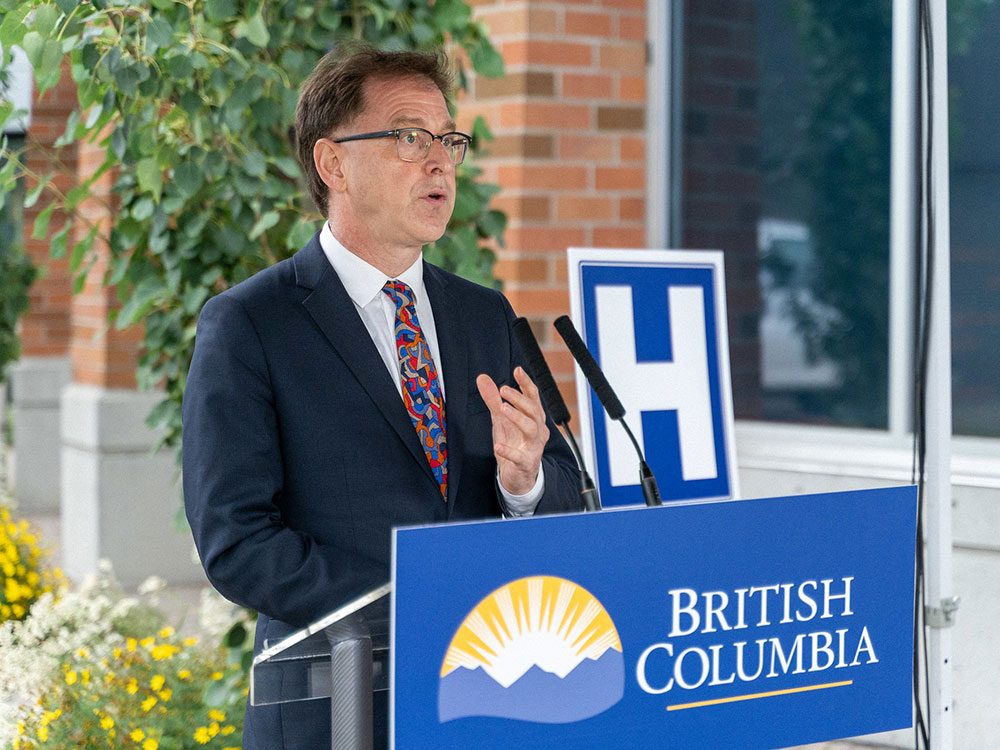The B.C. government and the group representing the province’s doctors have reached a tentative agreement they say will make it easier to find a family doctor and improve primary care by introducing a new payment model.
“Everyone deserves a family doctor and this new option is a significant step to help make that goal a reality,” said Ramneek Dosanjh, the president of Doctors of BC, emphasizing that the process was “shaped by the voices of physicians” and a true collaboration with the government.
Dosanjh participated in an event today alongside Health Minister Adrian Dix to announce the three-year Physician Master Agreement reached Tuesday.
“This is a very significant day for people who care about primary care in B.C.,” Dix said. “This is one step, but I’d say it’s a big step.”
The agreement, which the members of Doctors of BC will vote on over the next three weeks, adds $708 million in spending for the government. It includes increased pay for physicians, new premiums for after-hour service and more support to cover overhead.
About 80 per cent of primary care in B.C. is paid for through a fee-for-service model where doctors are paid a flat rate for each service they provide, regardless of how long it takes.
Under the new agreement there will also be payment for the number of hours a physician works and for how many patients they are caring for, including amounts that vary depending on how complex the patients’ needs are.
A doctor working full time in family practice will see their annual gross payments, before paying for overhead such as office rent or staff salaries, grow from an average of $250,000 a year to $385,000.
The government is also introducing a new system that will connect people looking for a family doctor with someone who can care for them more efficiently, so that patients will no longer need to call multiple clinics looking for someone who can fit them in.
There are roughly one million British Columbians who are unattached to a family doctor, a number that has grown steadily since at least 2003.
There are about 6,400 doctors in the province who identify as family physicians, but only about 3,400 of them are currently working in a full-service family practice. Many have chosen to work as hospitalists or in other positions where the pay and working conditions have been more attractive.
Dix said that when the new agreement is in place Feb. 1 it will help retain existing family physicians and should also attract new ones. The payment model is more equitable and better recognizes the value of having a long-term relationship between a doctor and a patient, while at the same time allowing doctors to maintain control of their businesses, he said.
The government has not announced specific goals for the number of family doctors or reductions in the number of unattached patients.
“You don’t know exactly how something’s going to work, but this is only one part of a number of measures,” Dix said.
The agreement improves family practice and creates incentives for doctors to work in it, he said, while also improving service for patients by increasing team-based care.
“I expect this will lead to more people and more doctors practising for longer,” Dix said. “This is a big element, but one element of our overall health human resources plan.”
Dosanjh, who sent a letter about the agreement to members of the Doctors of BC this morning, said she believes it is a significant step forward that will bring “an immediate sigh of relief” from family doctors.
The province has taken a major step by addressing rising overhead costs, she said, adding that elements like providing locum doctors to cover when people are away from work will improve working conditions.
“This will enable them to have a healthier working environment,” Dosanjh said. “We know healthier physicians and doctors make healthier patients.”
While it will take time to see how successful the measures are, they should help stabilize longitudinal family practice, she said. “This will not happen overnight. There’s still much work to be done.” ![]()
Read more: Health, BC Politics

















Tyee Commenting Guidelines
Comments that violate guidelines risk being deleted, and violations may result in a temporary or permanent user ban. Maintain the spirit of good conversation to stay in the discussion.
*Please note The Tyee is not a forum for spreading misinformation about COVID-19, denying its existence or minimizing its risk to public health.
Do:
Do not: